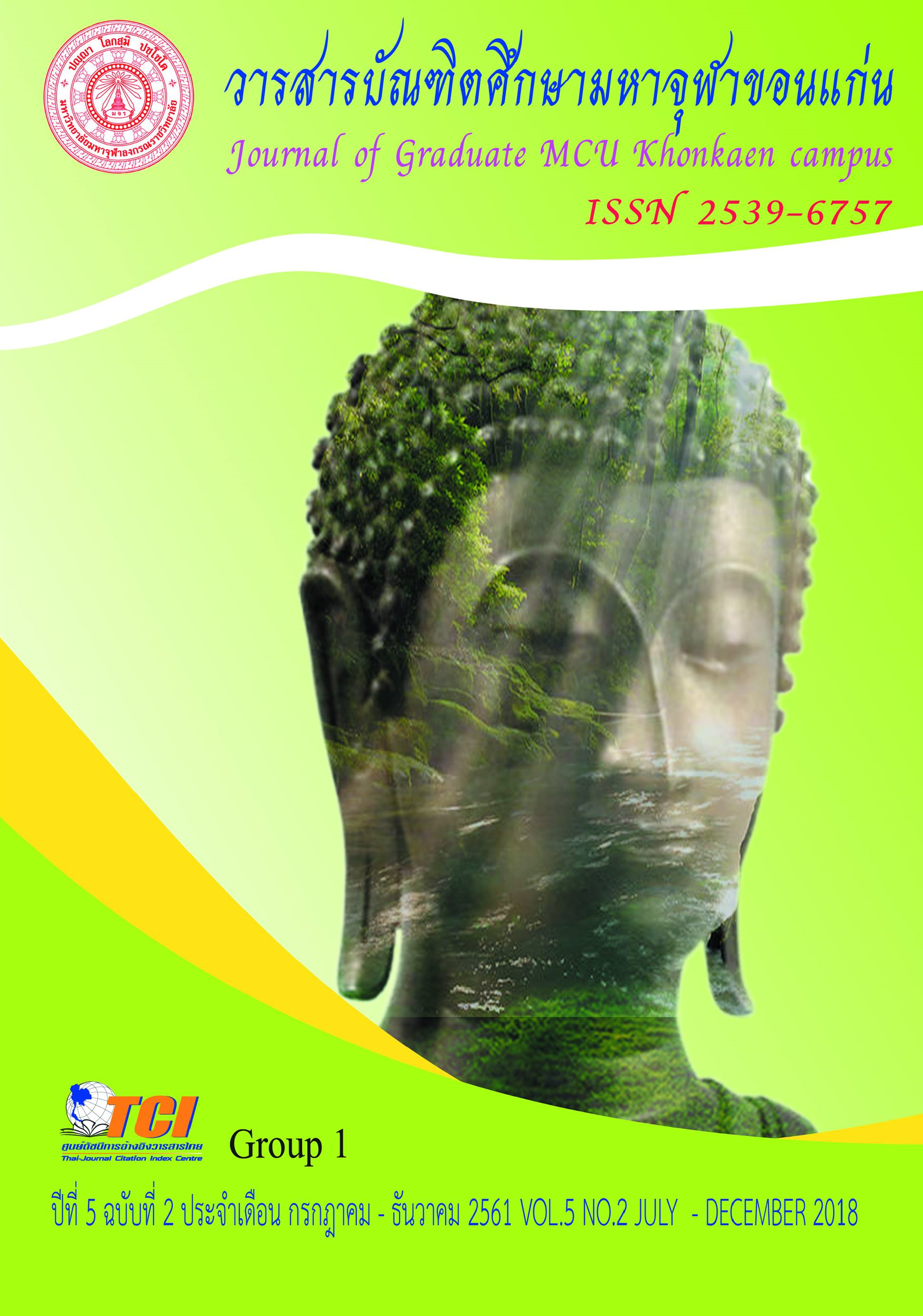แนวทางการพัฒนาวัฒนธรรมทางการเมืองประชาธิปไตยของประชาชน ในเขตเทศบาลเมืองชุมแพ จังหวัดขอนแก่น
Main Article Content
Abstract
การวิจัยนี้มีวัตถุประสงค์ 1) เพื่อศึกษาการกล่อมเกลาทางการเมืองและวัฒนธรรมทางการเมืองประชาธิปไตยของประชาชน ในเขตเทศบาลเมืองชุมแพ จังหวัดขอนแก่น
2) เพื่อศึกษาปัจจัยการกล่อมเกลาทางการเมืองที่ส่งผลต่อวัฒนธรรมทางการเมืองประชาธิปไตยของประชาชน ในเขตเทศบาลเมืองชุมแพ จังหวัดขอนแก่น และ 3) เพื่อหาแนวทางการพัฒนาวัฒนธรรมทางการเมืองประชาธิปไตยของประชาชน ในเขตเทศบาลเมืองชุมแพ จังหวัดขอนแก่นการวิจัยนี้เป็นแบบผสานวิธีทั้งเชิงคุณภาพและเชิงปริมาณ การวิจัยเชิงคุณภาพใช้การสัมภาษณ์เชิงลึกจากกลุ่มผู้ให้ข้อมูลสำคัญในอำเภอชุมแพ จังหวัดขอนแก่น รวมทั้งสิ้น 9 คน โดยทำการเลือกแบบเจาะจง เครื่องมือเก็บรวบรวมข้อมูล คือ แบบสัมภาษณ์เชิงลึกและวิเคราะห์ข้อมูลโดยการอุปมาน ได้แก่ การวิเคราะห์และตีความ การวิจัยเชิงปริมาณ ประชากร ได้แก่ ประชาชนที่มีสิทธิ์ออกเสียงเลือกตั้งและมีที่อยู่ตามทะเบียนราษฎร์ในเขตเทศบาลเมืองชุมแพ จำนวน 23,694 คน ได้ขนาดกลุ่มตัวอย่าง จำนวน 393 คน จากการคำนวณตามสูตรของ ทาโร ยามาเน่ Yamane (1973 : 726) ใช้วิธีการสุ่มตัวอย่างแบบชั้นภูมิและแบบง่าย เครื่องมือเก็บรวบรวมข้อมูล คือ แบบสอบถามแบบมาตรประมาณค่า 5 ระดับ สถิติที่ใช้วิเคราะห์ข้อมูล ได้แก่ ค่าเฉลี่ย ค่าร้อยละ ค่าส่วนเบี่ยงเบนมาตรฐานและการวิเคราะห์ถดถอยพหุคูณ
ผลการวิจัยพบว่า
1. ประชาชนมีความรู้ความเข้าใจวัฒนธรรมทางการเมืองประชาธิปไตยในเขตเทศบาลเมืองชุมแพ ด้านหลักอำนาจอธิปไตยของปวงชนอยู่ในระดับมากร้อยละ 34.1 ระดับปานกลาง ร้อยละ 41.5 และระดับน้อย ร้อยละ 24.4 ด้านหลักเสรีภาพ ในระดับมากร้อยละ 30.8 ระดับปานกลางร้อยละ 50.9 และระดับน้อยร้อยละ 18.3 ด้านหลักความเสมอภาค ร้อยละ 35.9 ระดับปานกลางร้อยละ 44.8 และระดับน้อยร้อยละ 19.3 ด้านหลักกฎหมาย ร้อยละ 41.9 ระดับปานกลางร้อยละ 36.9 และระดับน้อยร้อยละ 21.2 ด้านหลักเสียงข้างมาก ร้อยละ 53.5 ระดับปานกลางร้อยละ 30.5 และระดับน้อยร้อยละ 16.0
2. ทัศนคติของประชาชนที่มีต่อปัจจัยการพัฒนาวัฒนธรรมทางการเมืองประชาธิปไตยในเขตเทศบาลเมืองชุมแพ จังหวัดขอนแก่นในภาพรวมอยู่ในระดับมาก เมื่อพิจารณาเป็นรายด้านเรียงลำดับจากค่าเฉลี่ยมากไปหาน้อยได้ดังนี้ สถาบันทางการศึกษาอยู่ในระดับมากที่สุด (X̅=4.62) รองลงมาเป็น สถาบันทางการเมือง (X̅=4.54) สถาบันครอบครัว (X̅ = 4.53) สื่อสารมวลชน (X̅= 4.45) และด้านศาสนา (X̅=4.42) ตามลำดับ
3.ปัจจัยการกล่อมเกลาทางการเมือง ที่ส่งผลต่อวัฒนธรรมทางการเมืองประชาธิปไตยของประชาชน ในเขตเทศบาลเมืองชุมแพ จังหวัดขอนแก่นอย่างมีนัยสำคัญทางสถิติที่ระดับ .05ได้แก่ สถาบันครอบครัว สถาบันทางการศึกษา และสถาบันทางการเมือง ส่วนปัจจัยด้านศาสนาและสื่อสารมวลชนไม่ส่งผลแต่อย่างใด
4. แนวทางการพัฒนาวัฒนธรรมทางการเมืองประชาธิปไตย ได้แก่ ความร่วมมือร่วมใจกันระหว่างสถาบันครอบครัว สถาบันทางการศึกษา และสถาบันทางการเมือง ที่จะร่วมกันอบรมกล่อมเกลาทางการเมืองให้กับคนรุ่นใหม่ในชุมชนให้รับรู้และเข้าใจถึงหลักการประชาธิปไตยอย่างถูกต้อง โดยเริ่มจากสถาบันครอบครัวเอาใจใส่ดูและอบรมบุตรหลานของตนให้มีอุปนิสัยเอื้อต่อการเป็นพลเมืองที่ดีตามระบอบประชาธิปไตย จากนั้นสถาบันทางการศึกษาทำหน้าที่ในการถ่ายทอดหลักการทฤษฎีที่ถูกต้องทั้งในระบบห้องเรียนและกิจกรรมภายในโรงเรียน และสุดท้ายสถาบันทางการเมืองทำหน้าที่ทั้งในการให้ความรู้และเปิดช่องทางให้ประชาชนได้ทราบถึงกิจกรรมต่างๆ ที่ทางสถานบันทางการเมืองในแต่ละประเภทดำเนินการ ทั้งนี้หากทั้งสามสถาบันดำเนินการได้ครบถ้วน การพัฒนาประชาธิปไตยภายในชุมชนก็จะเป็นไปโดยง่าย
This Research aims to 1) Study the political and cultural democratic culture of the people. Chum PhaeMunicipalityArea, KhonKaen Province.2) To Study the factors influencing the democratic political culture of the people in Chum PhaeMunicipalityArea, KhonKaenProvince.3) To find a way to develop a democratic political culture of the people. Chum Phae Municipality Area, KhonKaenProvince.This research is a combination of both qualitative and quantitative methods. Qualitative research used in-depth interviews from key informants in Chum PhaeArea, KhonKaenProvince. Total 9 persons.Make specific selections.Data Collection Tool an in-depth interview and analysis of data by analogy, Analysis and interpretation. Population research is the population with the right to vote and the address of the registered population in the municipality of Chum PhaeAreais 23,694 people. The Sample size was 393, Based on the Taro Yamane formula (1973: 726). Simple and easy to use. Data collection was a five-level questionnaire. The Statistics used for data analysis were percentage, Standard deviation and multiple regression analysis.
The Research found that. 1) People have knowledge. Understanding Democratic Politics in Chum PhaeMunicipalityArea.The Main aspect of the sovereignty of the people. There were 34.1% moderate level, 41.5% moderate level, and 24.4% low level of satisfaction. Majority of liberty was 30.8%, Moderate level was 50.9%.The Average level was 35.9 percent, Moderate level was 44.8 percent. The law degree is 41.9%, The Moderate level is 36.9% and the low level is 19.3%. The legal aspect is 41.9%, The Medium level is 36.9% and the minimum level is 21.2%. The Majority is 53.5%. 30.5 percent and 16.0 percent respectively. 2) Attitude of people toward the development of democratic political culture in Chum PhaeMunicipalityArea,KhonKaen. The Overall level is very high. When considering each side, The order from the average to the least. The Educational institutions were at the highest level (=4.62), followed by the political institutions (=4.54), family institutions (=4.53), mass media (=4.45) and religion (=4.42) respectively. 3) Political instability That affects the democratic political culture of the people. ChumPhaeMunicipalityAreaKhonKaen.The Statistical significance at .05 level was family institution. Educational Institutions and political institutions. The Religious and mass media factors do not affect anything. 4)The Development of a Democratic Political culture is a Collaborative effort. Family institution Educational Institutions And political institutions.To join the political training for new generations in the community to recognize and understand the principles of democracy properly. Start with the family institution. And to train their children to have good habits to promote good democracy. The Educational institute is responsible for conveying correct theories in both the classroom and school activities. And finally, The political institutions. It serves both to educate and to open channels for the people. Know the activities. The way the political institutions operate in each category. If all three institutions are fully implemented. The Development of Democracy within the community will be simple.
Article Details
References
Srithongkum, P. and Rathachattranon, W. (2015).The Democratic Political Attitude of People in the Banchang Sub-District, Song Phi Nong District, SuphanBuri Province.Kasetsart University Political Science Review, 2(2), 32-44. Thamrongthanyawong, S. (2010).The Backgrounds, Political Culture and Political Participation of Thai Youth Leaders.NIDA Development Journal, 50(4),77-98 Wanitbancha, K. (2009). Statistics for research.Bangkok : Book Center of Chulalongkorn. Yamane, T. (1973).Statistics: An Introductory Analysis.(3th ed.).New York: Harper and Row Publication.

